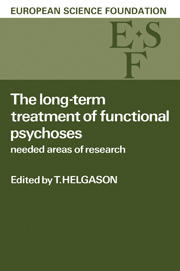Introduction
from Introduction
Summary
In this volume are assembled the papers presented at the second workshop arranged by the Study Group on Mental Illness Research of the European Medical Research Councils (EMRC). EMRC is an association of organizations supporting medical and biomedical research in 14 European countries, which started informal collaboration in 1971 but, 4 years later, was transformed into a Standing Committee of the European Science Foundation.
The aims of the EMRC are to exchange information on science policies and research activities and to identify areas where international cooperation and collaboration are of importance. Research on mental illness is one of the special areas which have been on its agenda for a considerable time. In 1978 the Study Group on Mental Illness Research was set up in order to promote European collaboration in this field. The emphasis is on research on treatment and on the evaluation of treatment. Consequently, the first priorities which engaged the attention of the Study Group can be seen in the title of the first workshop (Methodology in Evaluation of Psychiatric Treatment, edited by T. Helgason published by Cambridge University Press in 1983) and again in the title of this workshop.
The study group which planned the second workshop was composed of the editors of the present volume. During the preparation of this report our much cherished member, Professor B. Cronholm, died in October 1983. His knowledge of and experience in psychiatric research as well as his enthusiasm for better treatment and care of psychiatric patients was invaluable in selecting the topics of the EMRC workshop for promoting psychiatric research.
During the past three decades, a major change has taken place in the care and treatment of psychiatric patients, the main breakthrough being the development of effective drugs for treating the major psychoses. A number of psychotherapeutic treatments have also evolved during this period. The burgeoning of new treatments filled mental health workers with optimism, which culminated in the community mental health movement and almost in the belief that it was possible to treat and cure all mental illness, thus making the psychiatric hospital obsolete. Although the optimism has receded somewhat, as exemplifiedby the identification of the so-called new chronic patient, the development of community care has been carried out to its extreme in Italy, where it was decided to close all psychiatric hospitals and minimize hospital treatment of psychiatric patients.
- Type
- Chapter
- Information
- The Long-Term Treatment of Functional PsychosesNeeded Areas of Research, pp. 3 - 6Publisher: Cambridge University PressPrint publication year: 1985

